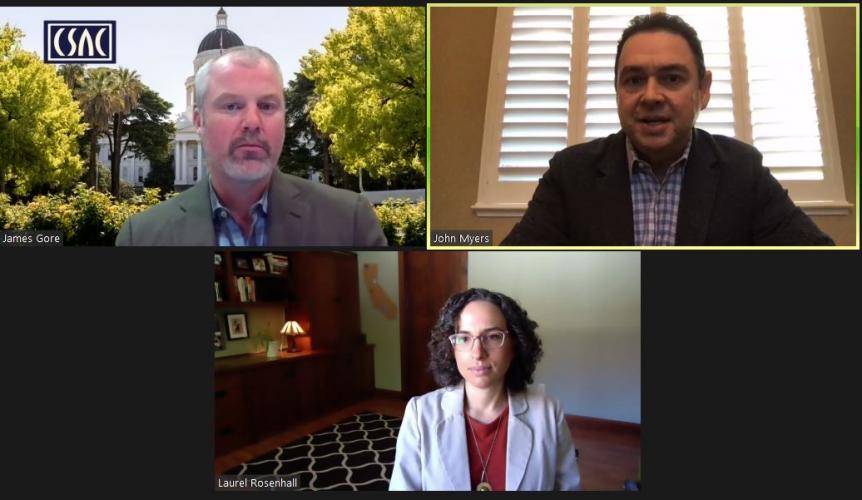2020 Election: County Impacts
 While the dust of the 2020 Election is still settling,
California County officials were treated to an insightful
discussion on the County impacts during Monday’s general session
of the 126th Annual Meeting. More than 180 county
representatives tuned in to hear John Myers, Sacramento Bureau
Chief for the Los Angeles Times, and Laurel Rosenhall,
Political Reporter for CalMatters, discuss the role of
ballot propositions, California’s influence in national politics
and the COVID-19 pandemic among a handful of other issues during
the session moderated by CSAC 1st Vice President and
Sonoma County Supervisor James Gore.
While the dust of the 2020 Election is still settling,
California County officials were treated to an insightful
discussion on the County impacts during Monday’s general session
of the 126th Annual Meeting. More than 180 county
representatives tuned in to hear John Myers, Sacramento Bureau
Chief for the Los Angeles Times, and Laurel Rosenhall,
Political Reporter for CalMatters, discuss the role of
ballot propositions, California’s influence in national politics
and the COVID-19 pandemic among a handful of other issues during
the session moderated by CSAC 1st Vice President and
Sonoma County Supervisor James Gore.
Propositions
Corporate campaigns involved with propositions were big winners in the 2020 election, according to Rosenhall. “Big interests will continue to be engaged in propositions and ballot measures as an escape hatch” for legislative actions that are less favorable to corporate interests.
Myers shifted to the important and persistent role of messaging in ballot propositions, citing the lack of Proposition 15 proponents to shift the focus from who would pay for the proposition to where the money would go. County leaders, he said, know all too well how important it is “to draw a line to the services needed at the local level.”
California Influence in National Politics
While President Trump used California as a foil for his vision of America, the next administration will likely be very different, according to Rosenhall. She highlighted the potential for California priorities, policies and people to be influential in the Biden/Harris administration. The ability of the new administration to push their agenda through Congress is yet to be seen, but she predicted that Executive Orders may be an important tactic to adopt more “California-style” polices. With the first Californian in the Vice President position since the 1960s, Rosenhall and Myers both agreed that “California will likely be influential in a way it hasn’t in quite a while.”
COVID-19 Pandemic
In terms of other things being different than they have been for a while, both Myers and Rosenhall agree that the COVID-19 pandemic has made it more difficult to report on politics. Rosenhall cited the lack of access to government officials and virtual formats not allowing for follow-up questions the way face-to-face conversations typically would. Myers echoed this sentiment adding that “we didn’t realize how important that (in-person communication) was.” One benefit to COVID-19 that Myers hopes to see continue is the increased participation in the political process, citing how many more people can participate in hearings and meetings when travel to Sacramento is not required.
Each panelist was given the opportunity for some closing remarks. Rosenhall urged members of the County family to identify and support those news outlets that are trustworthy and contribute to a healthy media ecosystem. These outlets, she urged, should be supported through readership and recommendations to others as audience numbers drive the media business.
Myers agreed, noting that journalism is at a crossroads as a profession. He went on to remind County leaders that we can all do more to provide the context and explanation to local government dialog. In particular, the path forward to effective and efficient governing requires all of us to focus more on informing our community members about issues rather than just provoking a response.
As 2020 winds to a close, the list of issues that the County family has to contend with continues to grow. These insights from key political reporters in Sacramento should be beneficial as County executives begin looking ahead to 2021.











































